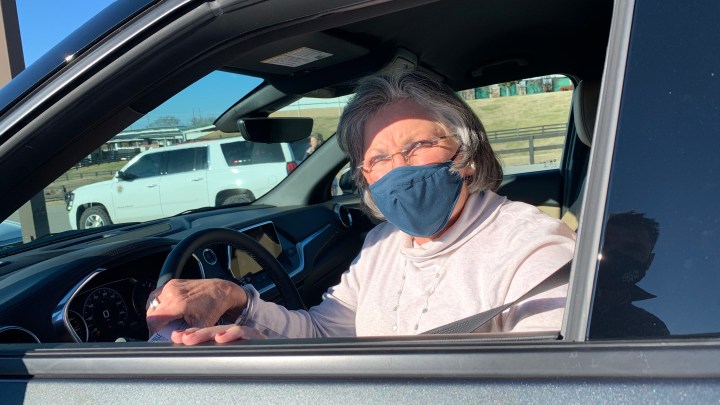
Logistical challenges just beginning for nation’s vaccination drive
Logistical challenges just beginning for nation’s vaccination drive

Age has its privileges in this case. Sally Kohn has her official COVID vaccination card in hand after getting her shot in the arm.
“That’s the first good thing that’s happened about being 76,” she said.
Kohn lives in Tennessee, just south of Nashville, where most county health departments are vaccinating people 75 and older. She drove through the Williamson County Agricultural Expo Park and received her dose right through the driver’s-side window.
“Everybody in there was friendly, professional. It was organized like Chick-fil-A had a hold of it,” she said, referring to the fast-food chain’s service. “I’m serious.”
But figuring out how to even get in line for a shot has been a source of frustration around the country.
The market for COVID-19 vaccines is unusual. The number of vaccines is limited, but they’re free. As more states are widening access to seniors in the general public, they’re having to figure out how to promote, and restrict, distribution at the same time.
And every state — and even some counties within each state — is doing it a bit differently, adding to the confusion, said Jennifer Kates of the Kaiser Family Foundation, which is updating a nationwide analysis of state prioritization plans.
The Centers for Disease Control and Prevention recently recommended that states start vaccinating people 65 and older. Some states have prioritized teachers and law enforcement, ahead of the CDC guidelines. And other states are making changes to their plans on the fly.
“Increasingly, states have been diverging from the CDC’s recommendations and from each other, and I think that’s because of different reasons,” Kates said. “Doing this in practice is much more difficult than you might plan.”
In the process, it’s creating some confusion.
“It’s really a maze for the individual to figure out,” Kates said.
And public health officials don’t want to put the word out too widely and risk having some people show up for naught.
Sally Kohn has a neighbor, who is a nurse, who helped her navigate the signup process online. They ended up on SignUpGenius. Most county health departments in Tennessee are using free online scheduling platforms, like Survey Monkey and Survey123.
“It is pretty disparate right now,” said Dr. Lisa Piercey, who leads the Tennessee Department of Health. “It’s working on the local level. But some of it is pretty rudimentary. I’ll leave it at that.”
Tennessee’s health department is overseeing most of the state’s vaccinations at this point and has linked to each county’s signup page. A more professional signup system is still under development, Piercey said.
State officials originally thought first-come, first-serve events would sidestep scheduling snafus. But those have resulted in long, frustrating lines in Tennessee and some other places around the country.
Appointments have turned out to be the way to go so people don’t get to the front of the line only to learn they’re not in the current phase of distribution — which can change by the day and by the county.
“We have to make sure you qualify,” Piercey said. “Otherwise you’re going to wait in line for five hours and then get turned away, and we don’t want to do that. That’s not going to be good for anybody involved.”
But the quick-fix scheduling systems may complicate some important data collection on the back end.
Right now, everyone has to return for a second dose to get the full protection. And Robert Chamberlain, co-founder of Nashville-based Applied Health Analytics, said it’s critical that if people get the Pfizer vaccine, they stick with Pfizer. Same for Moderna.
“To make matters even more challenging, we have AstraZeneca getting ready to hit the market, followed by Johnson & Johnson,” he said. “We’re going to have four different manufacturers making available vaccines in the market, which is awesome, which is wonderful. But the management of it is going to be the challenge.”
Chamberlain’s company has modified the flu-vaccination tracker it sells to health systems, called bMetrix, so it can be used for COVID-19, which is considerably more complex.
There’s money at stake.
“The federal registries are requiring very specific information that has to come back to them for these health systems and the people providing these particular vaccines to qualify for reimbursement from the federal government,” he said.
The distribution will only grow more complicated as it reaches more and more groups, like essential workers.
Dr. Anthony Harris is one of the medical directors of WorkCare, which provides on-site health services for multistate companies, including a semiconductor manufacturer and a soda bottler.
“Some states have clarified the role for large and medium employers. But most states, still, it’s a gray area,” he said.
With local health departments running full tilt as it is, Harris said, it only makes sense to give businesses a role in COVID vaccinations. The question for the incoming administration of Joe Biden will be whether it can find a way to streamline and speed up the process.
“Hopefully by the summer, we will have that messaging more clear,” Harris said. Until then, he said, his company will spend much of its time helping companies figure out how to get their employees vaccinated. “We’re prepared to continue jumping the hurdles.”
There’s a lot happening in the world. Through it all, Marketplace is here for you.
You rely on Marketplace to break down the world’s events and tell you how it affects you in a fact-based, approachable way. We rely on your financial support to keep making that possible.
Your donation today powers the independent journalism that you rely on. For just $5/month, you can help sustain Marketplace so we can keep reporting on the things that matter to you.












